Jonathan and Crystal Talk to Japes Palles about how actors and haunts can find a good match.
This blog is based on episode 179 of our Haunt Weekly podcast, in which Crystal and I interviewed Japes Palles, a man who’s worked all over the haunt industry, hither and yon, in a wide variety of roles. One of the main things he does coach and manage actors. He’s been on several podcasts before, and his wisdom has always been appreciated.
We talked to him about actor auditions and, because this has been a topic that’s been very big with various groups, we’ve got that in a bit more detail. In Japes, we brought in someone who knows a thing or two about a thing or two about auditions.
“I can say, from my own experience, I’ve not been on the actor side of auditions, but I can definitely talk about what it’s like from the management perspective for sure,” said Japes. “Don’t forget, though, that Midwest Haunter’s Conference is going to be in Chicago. Lost Souls might have a booth there, and Bruster may be roaming around like a lunatic for the entire weekend.”
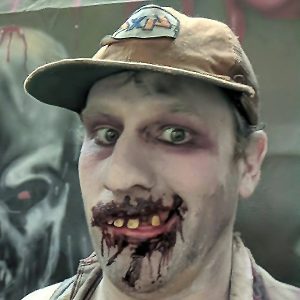
How Does an Actor Find the Right Haunt to Work For?
The topic of actor auditions has been coming up a lot in haunt groups. We’re getting into that season where haunts are starting to ramp up their actor-intake process. There was an article by Scott Swenson recently about this on the Haunted Attractions Network. A lot of the feedback we’ve been getting is from first-time actors.
“Right, and the one on Haunter’s Hangout that caught my attention just recently that sparked this particular talk was by Livia Ann,” said Crystal.
A lot of actors are thinking about working for a haunt. We asked Japes how one chooses which haunt to work for.
“I take a special interest in that question. Haunter’s Hangout is great, because it’s a massive network. I think there’s 30,000 members,” Japes said. “The majority of people get jobs not necessarily because of their talent, their skills, or their resume. It’s because of who they know. If you don’t know anybody at that haunt, you should just give it up. If you have someone connecting you there, at least you’re going to get people to look at your resume, bring you in for an interview, and have an opportunity to introduce yourself to the people who make that decision.
The goal of the Freelance Haunters Group isn’t to have massive numbers, because I want the conversations to be more directed, and I want people to be showcasing the skills they have. I want Freelance Haunters to be almost like a hiring page where haunt owners and actors can go and see what’s available. Whatever role you’re looking for in a haunt, you’ll be able to connect with those people,” he said.
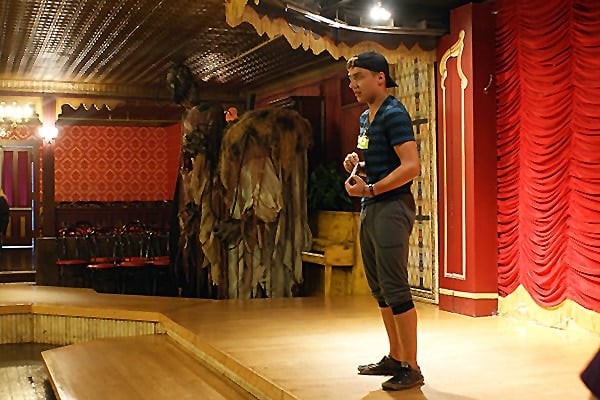
“In terms of how to choose where to audition, the first step is to reach out to your networks. You’ve got to connect to people. It’s about checking the culture of the haunt—would someone even want to work here? Is that place going to be a good fit? Different haunts have different styles and, if you understand your style, you’ll find someplace where you’re going to fit in better.”
Crystal added, “I’d also say to check out the haunts’ websites and their promo videos. Check the comments, and see how they deal with customers. A lot of times you can get a feel for the management side of it just by seeing if they got a bad review and how they react to that.”
“I think you’re totally right, Crystal, in that people need to do their research and look into the haunts—to understand what they’re doing,” commented Japes. “I have a perfect example. There’s a guy who used to work with me—one of the actors who worked at the Rob Zombie show—and he’s reached out to me in the offseason and said, ‘Hey, where should I go work? There’s all these haunts, so what should I check out?’ I can speak very highly about most of the haunts in Chicago, and I can recommend people. Having the insight of the culture of the haunt and how they take care of their people is important.”
What Should a Newbie Expect?
“Now that you’ve chosen which haunt you want to audition for, what should a newbie expect?” asked Crystal.
“Everybody there wants you to be successful,” replied Japes. “Their goal is to figure out what a person’s strengths are and if/how they’ll be a good fit in their show. They’re going to throw you a bone if they see you’re stumbling, messing up, or nervous. They’re not there to just crush people. They’re there to find people the right spot. A good audition is set up in a way where they’re looking at your strengths. If you haven’t actually worked in a haunt before, you’re going to start off low man on the totem pole. I’ve never met anybody who just walked in the door and had it.”
I commented that it’s probably a good thing people are a little uncomfortable at the audition. There are multiple ways to “win” the audition. There are many different styles of actors, many different ways you can do it.
Japes replied, “A good manager is going to look at your strengths and figure out where you fit. What’s more important than your acting ability is your professionalism and how you carry yourself. If you’re a person who’s open to learning and growing, you’re going to be a good fit to the team. Again, your acting ability—the actual skills needed for the haunt—are secondary.”
If you don’t get a call-back from an audition, it’s not necessarily knocking your professionalism or your acting ability. It may just be you weren’t a good fit for that haunt.
“That’s a great point,” Japes replied. “The people doing the hiring know what they need.”
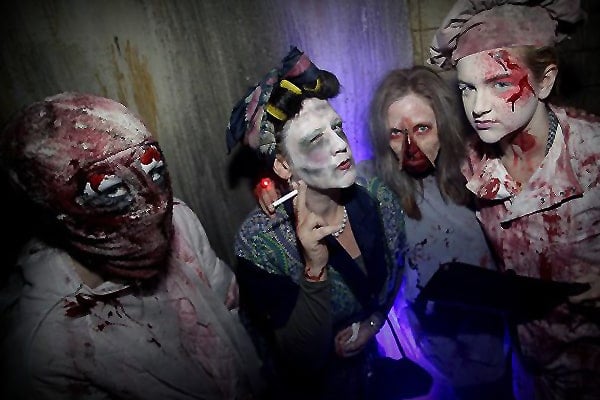 Image Credit The Isle of Thanet News
Image Credit The Isle of Thanet News
How to Formally Prepare for the Audition
I asked Japes how one prepares to meet formally audition at a haunt.
“Go to the website, figure out what this place is all about, and look at their promo videos on their website. Do they have a backstory? Ask yourself if there’s a huge storyline. If you go to Hells Gate, the storyline is massive and novel. Customizing your audition to the type of characters in that haunt is also good.”
“In our Livia Ann’s discussion,” Crystal added, “One audition asked her to come in makeup. Is it common to be asked to arrive in makeup or full character?”
“I don’t care about your ability to do makeup unless I’m hiring a makeup person,” Japes responded. “Now I’m going to throw out the hidden secret: I don’t think it’s a good idea for haunts to do auditions. The great majority of haunters—90%—aren’t actors. They’re people who want to scare people, not formally trained actors. Most have never auditioned for anything in their life. Putting makeup on is throwing them a bone. That’s why all of my trainings are done out of costume and out of makeup.”
I understood exactly what Japes was talking about. I’m very different behind a mask than I am in person. It’s almost inevitable.
“Right,” Japes agreed. “It took me a long time to get that. I can jump in and out of character. I’ve done Bruster with no makeup many times. I’ve played a character while I’m in regular street clothes many times.”
“That’s actually not one of the points I’d come up with for it,” responded Crystal. “With smaller haunts, we were expected to do our own makeup and provide our own costumes. If you don’t have the ability to do that, that could be an issue.”
It’s also true that many smaller haunts don’t have auditions, and they’re grabbing whatever warm body they can get off the street.
“I think I shared the story before with you all about the guy who I was ready to fire, and then we put a mask on him and he became a total rock star,” countered Japes. “Once they’ve got their makeup on, they feel less like themselves and more like somebody who should be in a haunted house, I feel like it’s going to show off a little bit and feel more anonymous. But you bring up a great point concerning the size of a haunt’s budget. You want to see what they can do with makeup because you don’t have a makeup team.”

How Haunts Can Make the Actor-intake Process Less Painful
I asked Japes what haunt owners can do to make auditions, or the intake process in general, less painful.
He responded, “I build the auditions into my actor training. Actor training is required. When I was managing, we’d do a full month of actor training—meaning, every Saturday there was actor training. There are several reasons I recommend that approach more than I do auditions. One, as I mentioned before, haunt actors usually aren’t trained actors. Two, what we’re really looking for isn’t always just acting ability but a good fit. Doing actor training every weekend for four weeks allows you to see everybody in groups. What happens during a break? Do the actors go and sit by themselves, or do they go grab a group of people? Maybe they came with a group of people. Do they just stick with that group of people, or does that group of people start connecting with other people that are there?” he said.
“If you’re a haunt owner, don’t expect people to do monologues and don’t expect people to even know how to audition. Just put them into a bunch of different situations where they can fail 70% of the time but still get 30% of the things they can actually use. That’s where you measure your intangibles. Can they follow direction, do they show up on time, do they show up every week? Do they get along with other people? Is there already drama by the second or second weekend between them and some other people? That’s going to tell you a lot more than an hour-long audition.”
When to Hire and How to Make Newbies Feel Welcome
I asked Japes about the best time of the year for holding auditions and actor training.
“Scott was talking about having all the haunts he was working for staffed by July. That’s insane,” Japes responded. “Don’t hire somebody for a job they’re not going to start in three months. I don’t see the point of hiring people in July and not expecting them to show up until October. If you’re not going to do the extra activities, then maybe you can start training in early to mid-August. However, you have to do actor training every weekend in September. To me, that’s almost a non-negotiable. You have to do that if you have the means to do so.”
The next question I ask Japes was how to make newbies feel welcome and part of the family.
“If you have a positive culture in your haunt already, it happens almost naturally,” he stated. “If you have a haunt that’s cliquey, it’s going to be difficult. If you create a culture of mentorship, teaching, and coaching, more people will stay on with you. It’s like evolution or natural selection—the people who stay are people who won’t stick their nose up in the air at newbies and think they’re above all that.”
“Is there a way,” Crystal asked, “to break up those cliques and try to get everybody to be more of a whole?”
“I’m big on smoke breaks, even though I don’t smoke myself. I still go outside for smoke breaks. People will naturally want to talk to me, because they know I’m in charge. They’ll come over and share haunting stories, characters they’ve thought of, or start asking me questions. People are naturally inquisitive. A lot of times they’re telling me stories. I’ll listen to their story, or I’ll answer or listen to their questions, and then I’ll start making introductions. I’ll start making connections for those people,” he explained.
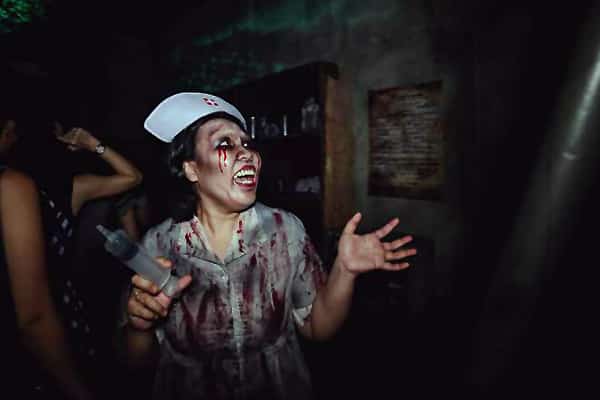
“I have a lot of experience. I’ve done this for a really long time, but I’m not the Bible of haunts. You can’t just read from me and know all the rules you have to live by. There are different perspectives, different ways of doing things. I never want my word to be totally law. In some areas such as safety and professionalism, if you don’t abide by what I say, we have a problem. Allowing other people to have a voice and letting people know you’re not the ultimate authority is a great way to let expertise flourish and, from that, you get to choose.”
Japes makes a lot of sense. I like that idea of making introductions. New actors gravitate to the people in charge, talk to them, and get some face time with them. This is something special that actor-managers need to focus on—helping to make friendships and connections—since no haunt pays enough for anybody to call it a job. People keep coming back because of the friendships they form and the social connections they make. Fostering those social connections has got to be a top priority.
For Most Actors, Working at a Haunt is All About Community
“That’s the real draw to working at haunted houses,” Japes agreed. “I know established haunts that pay minimum wage. This has been a big topic on Haunter’s Hangout. I’ve been really excited at looking at what people get paid. The great majority of people in that thread and that I’ve experienced don’t really care about the money. They want to be a part of a group where it’s okay to just be that. Haunters tend not to be mainstream people. Feeling accepted and being able to feel comfortable is really what people are looking for. You have to facilitate an environment that allows people to be that—but within parameters,” he said.
“There are things that are socially acceptable, and there are things that aren’t socially acceptable. I’ve dealt with a lot of actors in haunted houses who really need that stuff spelled out for them. What does it mean to be a professional? What does professionalism look like? If I can coach people on some haunted house stuff, that also helps them when they’re not at the haunted house. That’s a good thing—a win for everybody. It’s important to create an environment where people are comfortable and where people want to come back. Again, that takes a lot of curating of your people and making sure it’s always a safe and comfortable environment. The first two things I cover in my Basic Training 101, every single time, are, number one safety, and, number two, professionalism. Without safety, a haunt gets shut down, and without professionalism, nobody wants to come back. You’ve got to cover those.”
I totally agree. Without safety, a haunt is lucky if they get shut down. Without safety, a lot worse can happen than that.
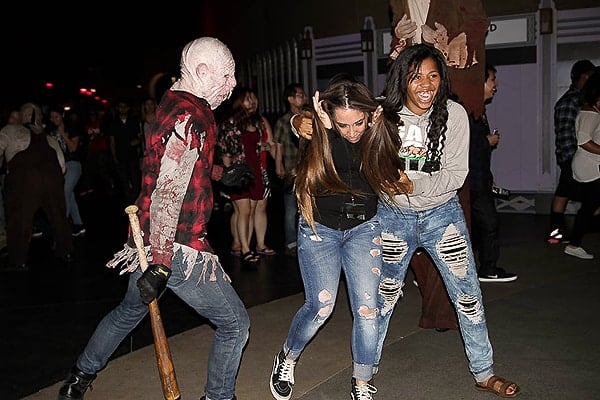
How to Bring Out the Actor’s Skills at the Audition
I next asked Japes, “What are some tips for spotting actor talents, for finding what makes an actor good for a specific role? Earlier, you shared some stories, like putting the guy in the mask, but what are some tips for coaxing out skills and weaknesses?”
“I believe in giving as many opportunities for actors to show different skills. If you want to stick with the standard audition style, by all means, do it, but make sure you’re allowing a lot of different skills to be shown. You may want somebody to do a monologue, or you may want somebody to be able to do improv. You may want somebody to enter the haunt, hide somewhere, and then check their timing to see how quickly that person pops out. Do they pop out at the right time, too soon, too late, etc.? What are they doing when they do pop out? It’s all about knowing what it is you need in your haunt and creating situations and opportunities for the people auditioning.”
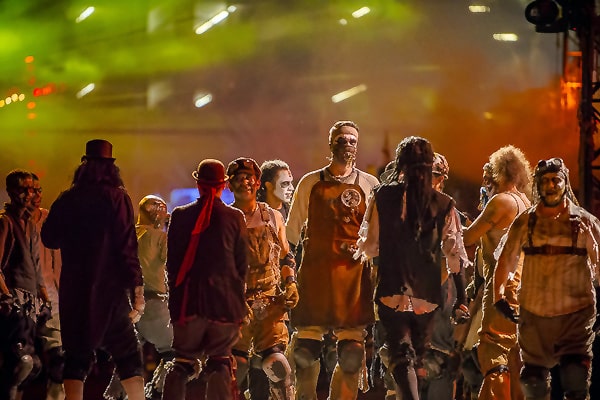
How to Tell an Actor They Aren’t a Good Fit
This led to my final question: “What are some tips for letting down actors that aren’t a good fit? We talked about what it means and why a candidate shouldn’t take it hard if they’re not chosen. But, still, if you’re the one doing the rejecting, it hurts—no one likes to tell anyone they’re not a good fit. What do you recommend?”
“This comes from my own experience with job interviews,” Japes pointed out. “It’s important that you follow up with the people you don’t choose and explain what, specifically, prevented them from getting the job. Give them an opportunity to learn from it. Next time, they won’t make that same mistake. You must let them know. Couch it in a ‘it’s not you, it’s us’ discussion. It could be that the person you auditioned is good at A, B, and C, but what you need is X, Y, and Z. It’s not that they’re bad, it’s just that they’re not a good fit.”
Japes is an amazingly well-informed guest. He knows all the ins and outs of working with acting personnel, which is an area in which I have little experience. We were lucky to have a chance to talk to him again.
“Thanks for having me on,” were Japes’ final words as I prepared to turn off the recorder. “It’s always fun to talk haunt stuff.”